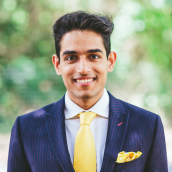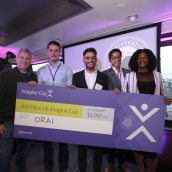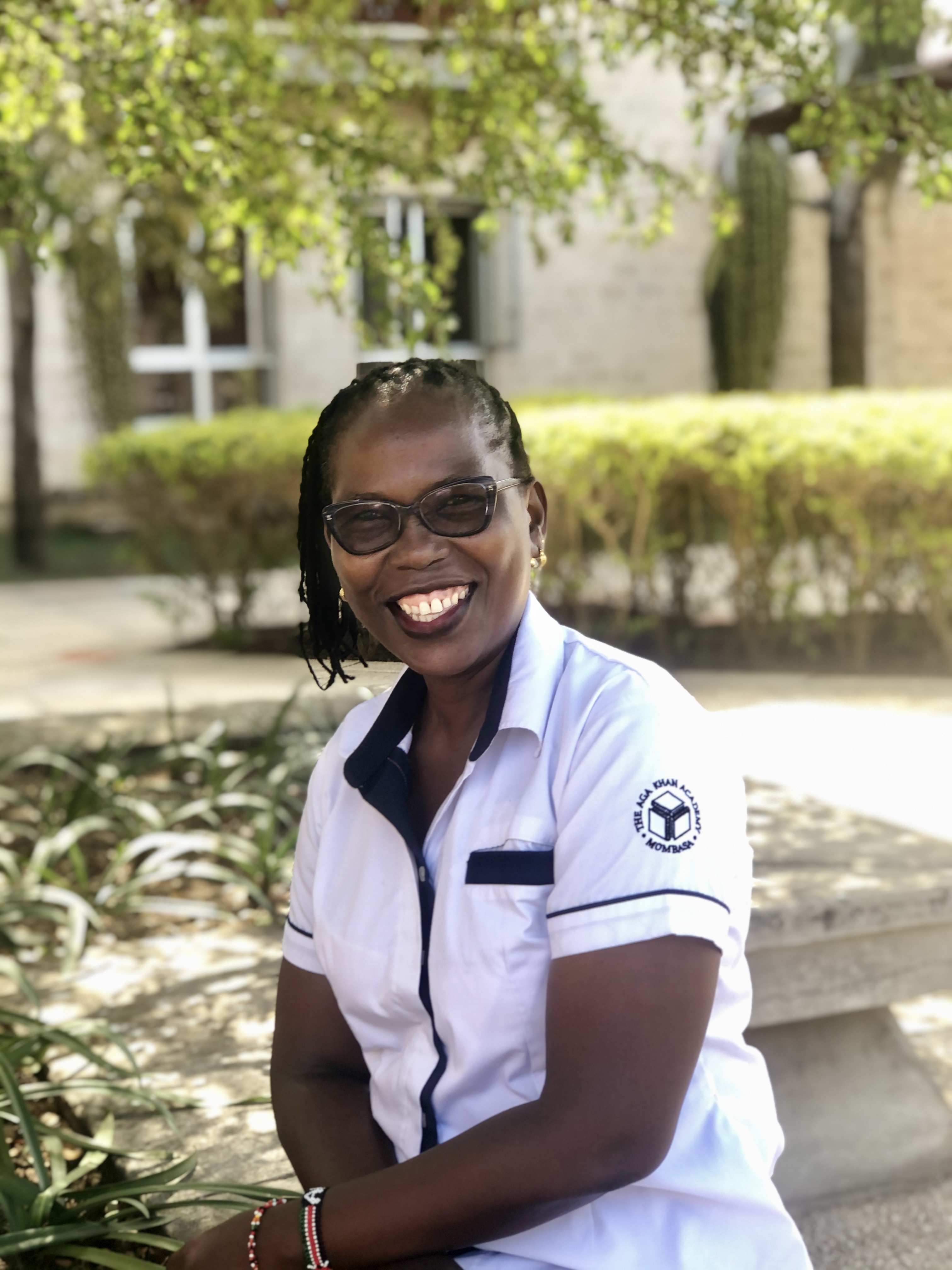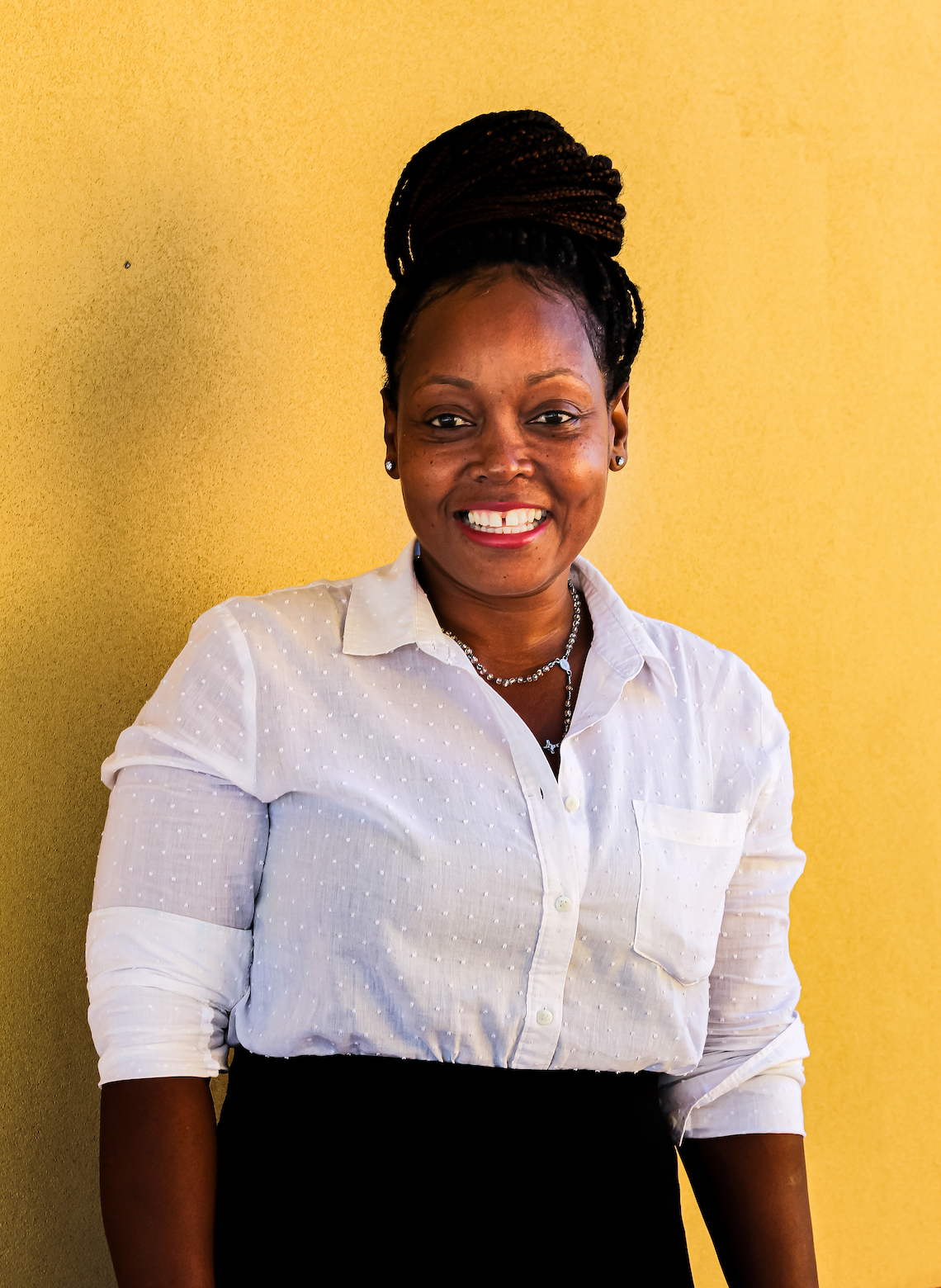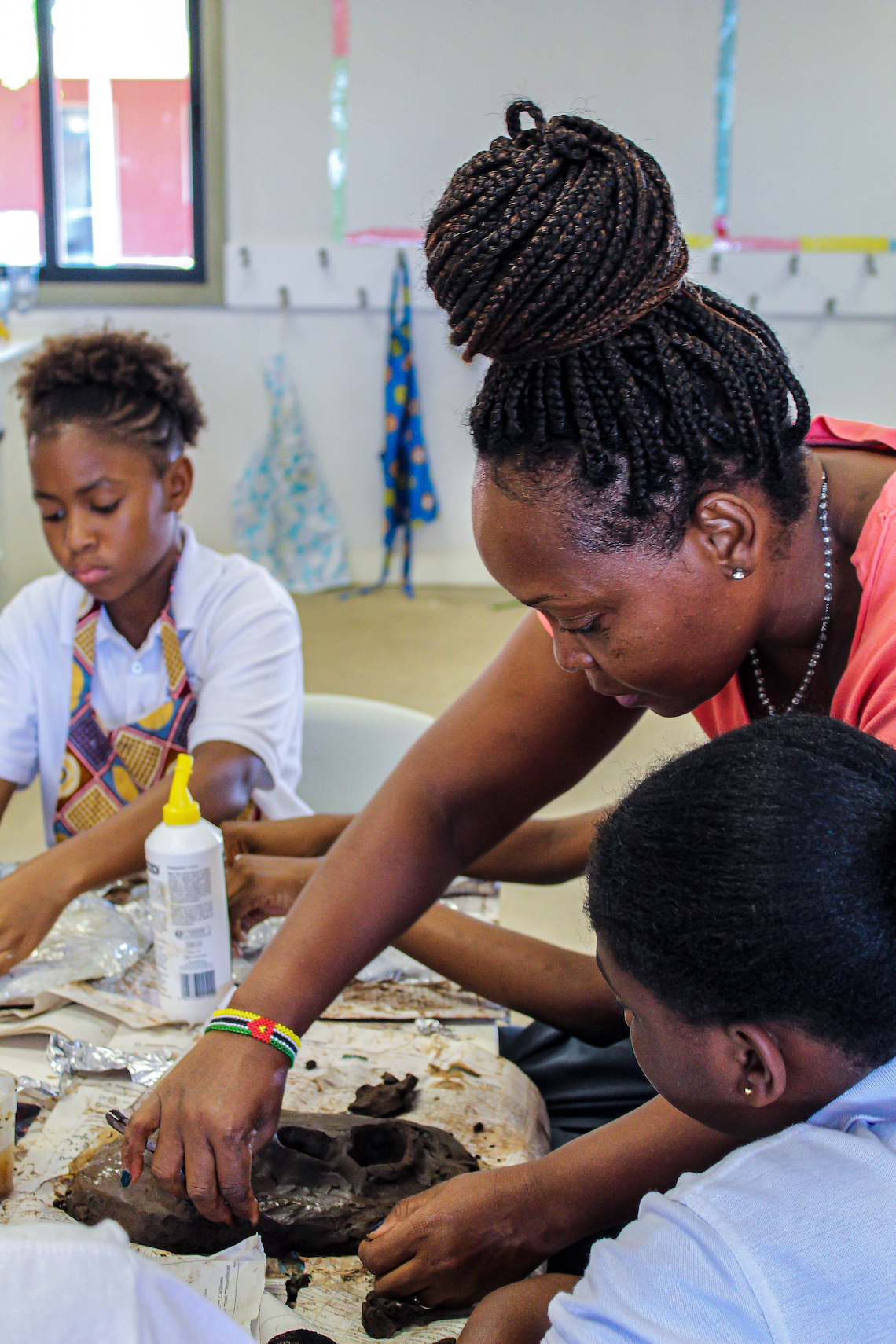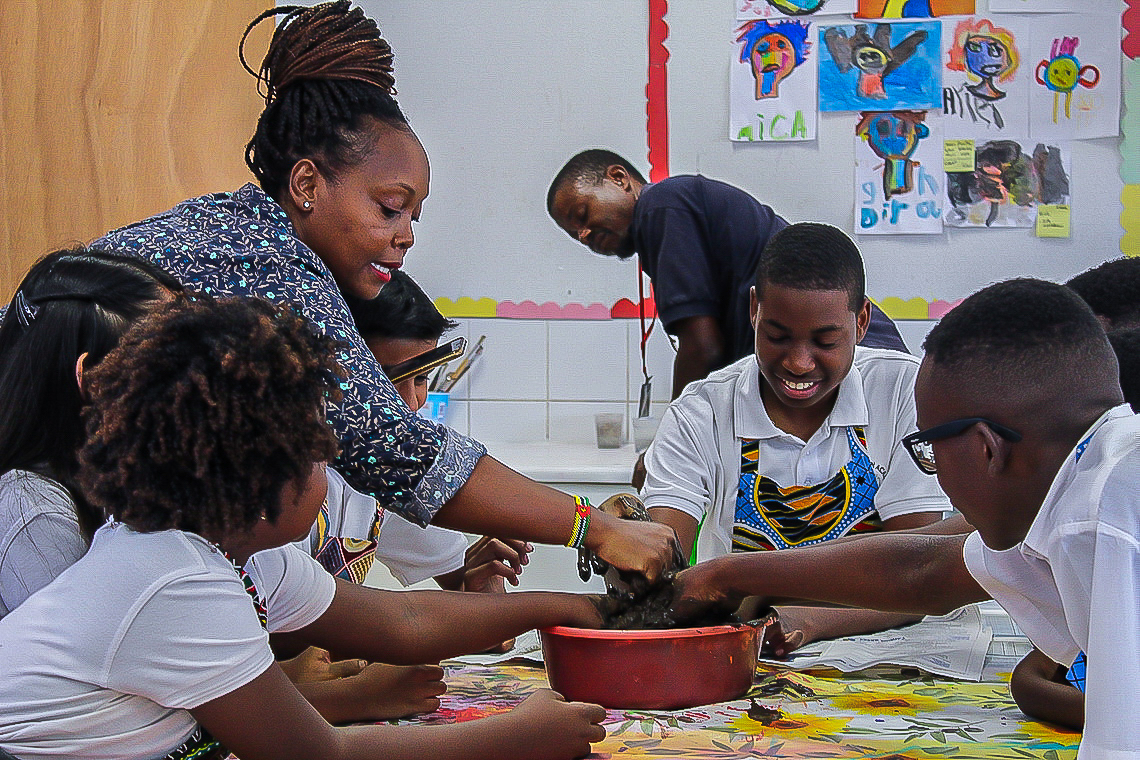Director of Academies Salim Bhatia's welcoming remarks to the 2017 graduating classes at the Aga Khan Academies in both Hyderabad and Mombasa.
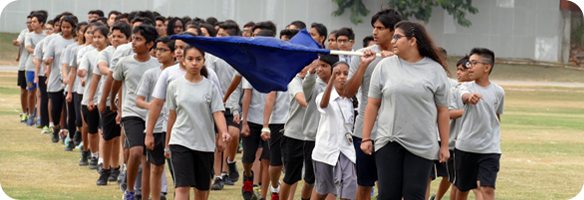
Diploma Programme
The Aga Khan Academy Dhaka is an International Baccalaureate (IB) authorised World School and has been authorised for the Diploma Programme (DP). The DP is a demanding, pre-university-level course of studies. It is internationally recognised by over 2,000 universities worldwide.
The DP has a reputation for rigorous assessment of student achievement. Each student’s performance and levels of knowledge are examined internally by teachers according to set criteria. They are also assessed externally by independent examiners according to global standards applied to all IB schools.
Our students study all the subjects covered in a traditional, broad curriculum, including languages, social sciences, experimental sciences, mathematics and the arts. The DP also takes the curriculum a step further through three unique programmes:
- Theory of knowledge;
- Creativity, activity, service; and
- Extended essay.
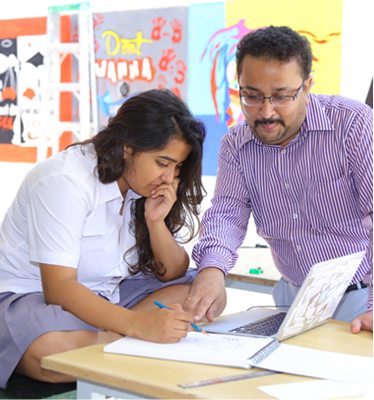 Theory of knowledge
Theory of knowledge
Theory of knowledge (TOK) is an interdisciplinary requirement unique of the DP. It encourages students to reflect on the knowledge they gain both inside and outside the classroom.
One hundred hours of classroom time are dedicated to the TOK programme. We challenge our students to question the nature of knowledge across disciplines, to recognise biases and to analyse evidence using rational thought and argument. By making our students consider and appreciate different perspectives, TOK contributes towards a pluralistic outlook.
Creativity, activity, service
Creativity, activity, service (CAS) is an important component of the IB curriculum and is required for every DP student at the Academy. Our students participate actively in a variety of creative endeavours, physical activities and community service projects. They develop self-confidence, teamwork and leadership skills, and a sense of civil responsibility.
Students take part in sustainable projects that have real and lasting effects on the greater Dhaka community. They develop strength of character and an understanding of their ability to bring about change.
The CAS programme is valued for its power to transform the lives not only of students but also the people they work with. It serves as a platform for interpersonal exchange, personal growth and greater understanding of the issues we face as a global community.
Extended essay
The extended essay (EE) requires students to pick a subject of their choice and research and develop it into a 4,000-word essay. Students may choose to investigate a subject from one of their higher-level courses more deeply. Or they can broaden their academic experience by researching a subject in a field they are not currently studying.
Through the EE, we introduce students to the kind of independent research and writing skills expected at the university level.
For further information on the IB Diploma Programme at the Academy, please see the admission requirements or contact us.
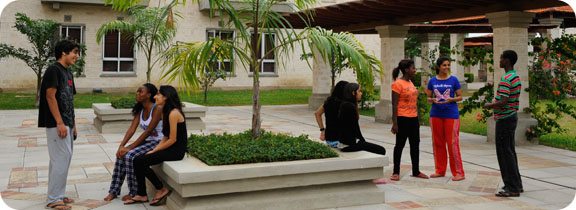
Living on Campus
Residential life at the Academy complements and extends the academic experience. The residential programme includes a broad selection of activities and leadership opportunities to enhance students’ learning and growth.
The Academy's residential programme officially opened in April 2009. Our student residences have been designed to accommodate students and dorm parents, who are teachers who have been chosen carefully and trained to live in the faculty apartments in the student residences.
Up to four students share a room. The rooms are spacious with high ceilings and large windows. Facilities include a student lounge with a breathtaking view out to sea and a large-screen television along with laundry facilities.
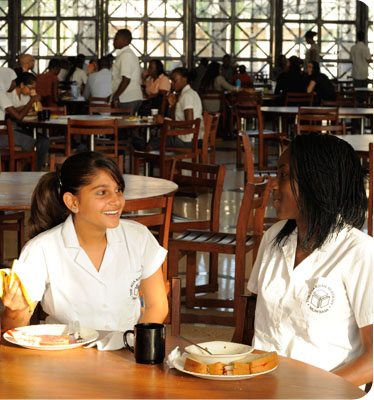 The Commons building houses the dining hall and an array of spaces for school activities. It is the hub of student activity and serves as the main space for major school functions, including music and drama performances and public lectures.
The Commons building houses the dining hall and an array of spaces for school activities. It is the hub of student activity and serves as the main space for major school functions, including music and drama performances and public lectures.
“The tour of the residential facility gave me a great sense of fulfillment,” said Bernard Dudi, a teacher and dorm parent. “I appreciate the amount of planning and resources and the thoroughness of the execution.”
Learning beyond the classroom
The culture of the Academy is based on respect, integrity, honesty, fairness, empathy and good humour. Our students, teachers and administrative staff create and sustain this positive learning environment.
The experience of our pluralistic learning community is especially rich for students in residence given the constant interactions among students, faculty and staff from diverse backgrounds.
The focus of the residential programme is on students’ intellectual, social, spiritual and physical growth in a structured and ethical environment. In the words of Aziz Batada, a former dorm parent, “The residential experience allows the typical school day – where the vision of the Aga Khan Academy is continuously being lived – to be extended, and education itself is seen as a part of every moment of an individual's life.”
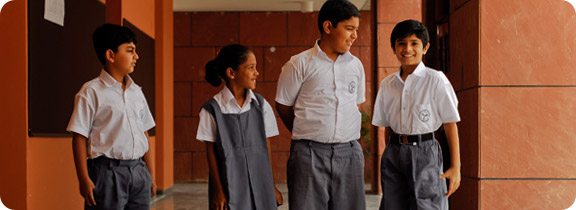
International Exchanges
As the network of Aga Khan Academies becomes established, we will offer our students the opportunity to broaden their experience through exchanges with other Academies.
The Aga Khan Academy Maputo will include an international exchange programme as part of the Senior School curriculum. This will provide our students with the opportunity to study for an extended period in another of the approximately 18 (planned or currently under development) Academies in Africa, South and Central Asia, and the Middle East.
Campus life
Students from Maputo who go on exchange to another Academy will live in residential facilities in a safe, secure campus setting.
Campus life is an important part of the international exchange programme. Many of the least tangible but most important elements of an education – the development of practical leadership skills, the capacity to make ethical judgments, the ability to navigate through complex cultural settings – are formed outside the classroom. Mealtimes and other informal gatherings offer opportunities for discussion, meetings, language tables and study groups.
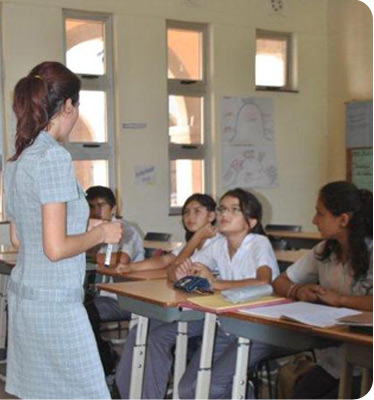
A number of students from Tajikistan are presently studying at the Aga Khan Academy in Mombasa.
Benefits of study abroad
The International Baccalaureate programme will be implemented at all Aga Khan Academies. The common curriculum will allow students to study abroad without facing uncertainties regarding compatibility of course study or examinations.
While English is the medium of instruction at all Academies, our students are required to study another language as well. Foreign language learning will be greatly enhanced by immersion in that language through the exchange programme.
Students will also learn to appreciate and respect other nationalities, cultures and intellectual traditions through direct contact with people in other countries. They will broaden their worldview and learn to be at ease in multicultural settings.
For further information on the educational programme offered at the Aga Khan Academy Maputo, please visit the Academic Programme page.
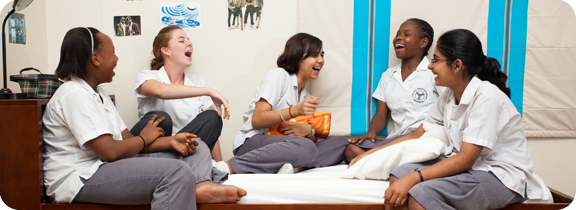
International Exchanges
As the network of Aga Khan Academies becomes established, we will offer our students the opportunity to broaden their experience through exchanges with other Academies.
The Aga Khan Academy, Dar-es-Salaam will include an international exchange programme as part of the Senior School curriculum. This will provide our students with the opportunity to study for an extended period in another of the approximately 18 (planned or currently under development) Academies in Africa, South and Central Asia, and the Middle East.
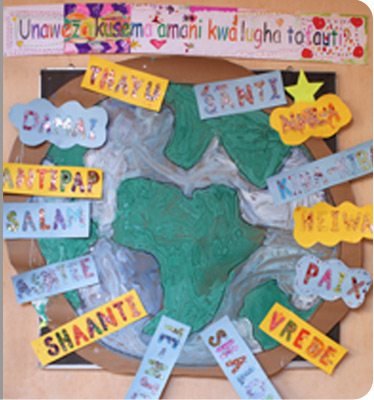 Campus Life
Campus Life
Students from Dar-es-Salaam who go on exchange to another Academy will live in residential facilities in a safe, secure campus setting.
Campus life is an important part of the international exchange programme. Many of the least tangible but most important elements of an education—the development of practical leadership skills, the capacity to make ethical judgments, the ability to navigate through complex cultural settings—are formed outside the classroom. Mealtimes and other informal gatherings offer opportunities for discussion, meetings, language tables and study groups.
Benefits of Study Abroad
The International Baccalaureate programme will be implemented at all Aga Khan Academies. The common curriculum will allow students to study abroad without facing uncertainties regarding compatibility of course study or examinations.
While English is the medium of instruction at all Academies, our students are required to study another language as well. Foreign language learning will be greatly enhanced by immersion in that language through the exchange programme.
Students will also learn to appreciate and respect other nationalities, cultures and intellectual traditions through direct contact with people in other countries. They will broaden their worldview and learn to be at ease in multicultural settings.
For further information on the educational programme offered at the Aga Khan Academy, Dar-es-Salaam, please visit the Academic Programme page.
Living on Campus
Residential life at the Academy complements and extends the academic experience. The residential programme includes a broad selection of activities and leadership opportunities to enhance students’ learning and growth.
Our residential programme launched in April 2019, allowing students from across Mozambique to study at the Academy. Student residences are designed to accommodate students and dorm parents – teachers that have been chosen carefully and trained to live in the faculty apartments and student residences.
Up to four students share a room. The rooms are spacious with high ceilings and large windows. Facilities include a student lounge with IT facilities, wifi and a large-screen television along with laundry facilities.
The Commons building, when completed, will house the dining hall and an array of spaces for school activities. It will be the hub of student activity and serves as the main space for major school functions including music and drama performances and public lectures.
A photo gallery of the Aga Khan Academy Maputo Campus is available here »
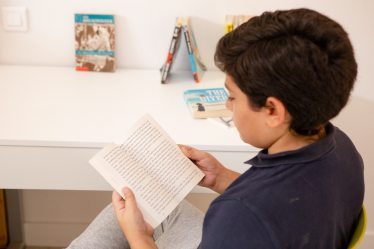 Learning beyond the classroom
Learning beyond the classroom
The culture of the Academy is based on respect, integrity, honesty, fairness, empathy and good humour. Our students, teachers and administrative staff create and sustain this positive learning environment.
The experience of our pluralistic learning community is especially rich for students in residence given the constant interactions among students, faculty and staff from diverse backgrounds.
The focus of the residential programme is on students’ intellectual, social, spiritual and physical growth in a structured and ethical environment. In the words of Aziz Batada, Head of the Residential Programme and Dean of Students at AKA Maputo, “The residential experience allows the typical school day – where the vision of the Aga Khan Academy is continuously being lived – to be extended, and education itself is seen as a part of every moment of an individual's life.”
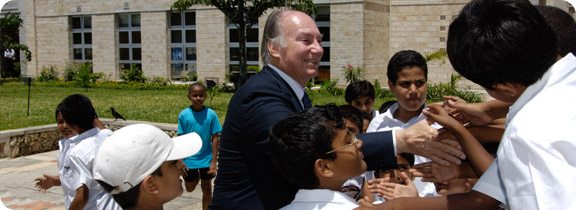
Speeches
Keynote address by Her Excellency Margaret Kenyatta, First Lady of the Republic of Kenya, at the 10th graduation ceremony of the Aga Khan Academy Mombasa
Speech by Salim Bhatia, Director of Academies, at the 10th graduation ceremony of the Aga Khan Academy Mombasa
Graduating student Joshua Ekirikubinza's speech, given on behalf of the Aga Khan Academy Mombasa's Class of 2015
Welcome address by Director of Academies Salim Bhatia at the AKA Hyderabad and AKA Mombasa 2015 graduation ceremonies (conducted simultaneously)
Keynote speech by Dr Matt Reed, CEO AKF India at the 2015 graduation ceremony in Hyderabad
Welcome address by Salim Bhatia, Director of the Aga Khan Academies network, at the inauguration of the Aga Khan Academy Hyderabad
Speech by His Highness the Aga Khan at the inauguration ceremony of the Aga Khan Academy Hyderabad
Speech by Director of Academies, Salim Bhatia, at the graduation ceremony at the Aga Khan Academy Mombasa
Keynote speech by Mr Jan Mohamed at the graduation ceremony at the Aga Khan Academy Mombasa
Remarks by His Highness the Aga Khan at the Academy of Sciences in Lisbon
Speech by His Highness the Aga Khan at the foundation stone-laying ceremony of the Aga Khan Academy Dhaka
Salim Bhatia's welcoming remarks at the foundation stone-laying ceremony of the Aga Khan Academy Dhaka
Speech by Dr Hossain Zillur Rahman at the foundation stone-laying ceremony of the Aga Khan Academy Dhaka
Welcome address by Salim Bhatia at the foundation stone-laying ceremony of the Aga Khan Academy Kampala
Speech by H.E. Yoweri Kaguta Museveni at the foundation stone-laying ceremony of the Aga Khan Academy Kampala
Remarks by His Highness the Aga Khan at the foundation stone-laying ceremony of the Aga Khan Academy Kampala
Salim Bhatia's welcoming remarks at the residential campus foundation stone-laying ceremony, Aga Khan Academy Mombasa
Remarks by His Highness the Aga Khan at the foundation stone-laying ceremony of the residential campus, Aga Khan Academy Mombasa
Speech by the Chief Minister at the foundation-stone laying ceremony of the Aga Khan Academy Hyderabad
Opening remarks by Salim Bhatia at the foundation stone-laying ceremony of the Aga Khan Academy Hyderabad
Remarks by His Highness the Aga Khan at the foundation stone-laying ceremony of the Aga Khan Academy Hyderabad
Remarks by His Highness the Aga Khan at the groundbreaking ceremony of the International Academic Centre of Excellence, Dar es Salaam
Pages
Danish Dhamani (Class of 2013): Everything’s gonna be Orai
Critical thinker. Life-long learner. Global citizen. Three traits, fostered during his time at the Aga Khan Academy, that characterise Danish Dhamani as he now graduates from Drexel University with a BSc in Mechanical Engineering. A 2013 graduate from the Aga Khan Academy Mombasa, Danish was an integral part of the residential community and president of the Student Representative Council during his two years at the school.
When asked about his most cherished memories, Dhamani reminisced about the sense of community that developed as a result of the residential program. “People became really close to one another, like an extended family. We had meals together, we celebrated birthdays and special occasions together, and we studied together… One really memorable event for me was singing ‘Happy birthday and kata keki’ (‘cut the cake’ in Swahili).” Danish’s term serving as president of the Student Representative Council was similarly rooted in the idea of building a familial sense of community, and most of his events were geared towards achieving this goal.
Four years later, Danish continues to think outside the box and combine his personal interests with making a difference in the society. Upon arriving at university, he discovered that he needed to improve his public speaking skills. Danish realised that this is a problem that affects many people around the world.
His solution to this problem? Orai.
Orai is a mobile app that aims to make anyone become a better public speaker using artificial intelligence. From tracking the number of ‘ums’ and ‘you knows’, to assessing the “tone” of your speech, the app provides a comprehensive report and suggestions on how you could become a better presenter. The intelligent engineering of the algorithms and attention to detail in the app literally leaves no person speechless.
At present, his venture has won approximately $50,000 in prizes. Orai won 2nd place in the Microsoft US Imagine Cup Finals and advanced with 6 other ventures to the Imagine Cup World Finals in July 2017. Motivated to take his venture to the next level, along with his co-founder, Danish will be working full-time on Orai post-graduation. His efforts and dedication towards Orai has now impacted the lives of over 30,000 users around the world.
As he reflects on his time at the Academy, Danish specifically remembers his classes with Mr. Alchin. “He looked at the world very differently,” he notes. Teachers such as Mr. Alchin instilled in Danish the capacity and willingness to think outside the proverbial box. In preparing him for university, both the International Baccalaureate curriculum and the opportunity to engage in extracurricular activities broadened his perspective towards the world and made him a lifelong learner.
His vision for the future is to be able to reside in a world where individuals are exposed to the global issues such as food insecurity and global warming from a young age, and are equipped with knowledge on latest technological advancements to engage in problem solving and action driven initiatives.
By Karina Hussein
Milka Gatungoh: The dedicated school nurse
When Milka Gatungoh joined the Aga Khan Academy Mombasa in 2010 as the residential school nurse, she knew her experience was going to be exciting and fulfilling. Her main role has been to address the physical, mental, emotional and social health needs of all school members, especially of students, to ensure their success in the learning process.
In the 10 years she’s been with the Academy, Milka’s favourite parts about the school is the pluralistic community, its culture of giving back to others in society, as well as the positive work environment that enables one to grow professionally.
“The cultural diversity and involvement in community service, which provides us with the opportunity to help others in a very special way, are my favourite things about the Academy,” Milka said. “There is also a lot of potential for one to nurture their career if they know what they want to achieve in life.”
As a little girl, Milka never liked to see anyone in any kind of pain so she always made sure to reach out to help. As the residential school nurse, she continues to be compassionate and empathetic when caring for students because she feels it makes a huge difference to understand what they’re going through in order to offer the necessary support.
“I always have to engage with students emotionally because sometimes their physical pains are caused by emotional distress, also known as psychosomatic illnesses," Milka stated. "Offering emotional support is sometimes the only remedy they need and not necessarily painkillers."
At the onset of the coronavirus pandemic, Milka said her role changed drastically, which has been rather challenging, but has gotten better with time. Being on the frontline, she has had to work extra hard to educate people on the virus, demystify the myths, fight any stigma and ensure all necessary protocols are followed for the safety of all school members.
“I have had to emphasise on the importance of people observing the World Health Organization safety measures regarding the virus, which was a little difficult initially as the reality of COVID-19 had not hit most of the students and staff,” Milka said. “As a caregiver on active duty, I also faced a little stigma because people thought of me as a risk factor for contracting the virus. Additionally, I’ve had some people express concern about visiting the health and wellness centre at the Academy for fear of being subjected to a COVID-19 test, especially when they have cold symptoms. Despite all these challenges, I’m glad I have been able to offer support and care.”
To further help spread positivity during the pandemic, Milka has been providing psychosocial support for students through virtual seminars by encouraging them to develop a caring attitude and helping them cope with any fear or anxiety they may have.
For Milka, the most rewarding part of her job is seeing the students she nurtures live healthy lives and succeed in their school life. As she continues to do what she loves the most, which is being of service to others, Milka said the fulfillment of her purpose in life is guided by a set of first aid goals, which are, to preserve life, prevent further injury and promote recovery.
“Whenever I’m attending to anyone, I am keen to ensure that I stick to these goals, which have become my motto in life,” Milka said.
Mahek Shah: Taking flight to her dreams
Mahek Shah, a Diploma Programme student at the Aga Khan Academy Mombasa, believes she knew she wanted to fly as soon as she learnt to walk. A young aviator who is driven to change the fact that the aviation industry is male-dominated, Mahek attended a 12-day British Aviation Camp from 16-27 July in the United Kingdom. She is also the curator of Wings for Women, a project she started as part of the International Baccalaureate Middle Years Programme curriculum that educates teenage girls in Kenya on becoming pilots.
Captain Irene Koki Mutungi is the inspiration behind her project. As the first African female captain of the Boeing 787 “Dreamliner” aircraft, Captain Koki actively emboldened Mahek to spread awareness among young girls through her initiative.
“Captain Koki encourages women to break stereotypes and work hard to achieve their dreams,” Mahek said. “She has held several motivational sessions within Kenya and has played an important role in shaping careers of numerous women.”
Wings for Women is currently based in Mombasa, with workshops being successfully conducted in both Mombasa and Nairobi. At present, Mahek’s 14-member student led team, is focusing on scaling up the project by expanding their target audience across Kenya.
Born in the UK, Mahek was raised in Mombasa, and looks forward to attending college in the UK. The summer camp organised by Brookfield Aviation has fortified her ambition of becoming a pilot.
The camp comprised of flight training courses which consisted of three, one-hour flight lessons in a light aircraft (Piper A28). In addition, Mahek underwent ground school training in Air Law, Navigation and Communications. She also attended aerobatic flying and helicopter lessons.
According to Mahek, practising on simulators at the Emirates Full Motion Simulators was the most challenging and exhilarating aspect of her training.
“Flying two different simulators took some getting used to,” Mahek said. “The A-380 simulator used a joystick, and it was only after two trials that I managed to land the plane. The B-777, on the other hand, was much easier to fly using a yoke.”
Another important facet of her training was meeting airlines and touring headquarters, as part of which she underwent Safety and Emergency Procedures (SEP) Training at British Airways, and visited the British Airways Heritage Centre.
Mahek’s passion and ambition to be a pilot has snowballed into a bigger mission of advocating for gender equality in her chosen field. According to Mahek, the Aga Khan Academy Mombasa and the guidance of her teachers have been instrumental in shaping her experiences in steering through the aviation industry.
“I use the Academy’s learner profile attributes, specifically caring and open-mindedness to engage with people from the aviation industry,” Mahek said. “This experience has enabled me to become a more ethical decision-maker, who is also very tolerant and pluralistic.”
Rosa Jorge: Encouraging expression through the arts
A new arrival at the Academy in Maputo, Rosa completed the Academies’ Teacher Preparation Programme (TPP) at the AKA Mombasa in December 2019. Calling it one of the most rewarding experiences of her life, she lauds the Problem-Based Learning (PBL) Sessions for pushing her to be a better teacher.
Looking back at her TPP journey, Rosa recounts, “I, personally, have seen myself grow as a teacher and a social individual. The experience has changed the way I approach the teaching and learning process. As teachers, it is possible to change the world through education – all we have to do is believe in that and go do it!”
Drama in the family
She began her now 20-year journey with drama from the nascent age of 14. When her brother and friends were taking up extra-curricular activities such as swimming and football, Rosa’s only interest was joining Mutumbelinhas, a local children’s theatre group. She credits her aunt, who ran the group, for helping her break away from her shy persona. “My hubsand put together a play called ‘Ziraldo’ based on the Brazilian writer's life. It was such a big change for me because I was a shy kid and through drama, I became a different person,” she recounts.
Since then, the stage has become her life. It is where she met her husband, who is a director of the Mbeu theatre group and a teacher at Universidade Eduardo Mondlane. It is also the field of work for her son, a theatrical producer and her sister, an actress.
Empowering students with confidence through arts and drama
She hit the ground running in Maputo taking on her role as the Academy’s Drama teacher in January 2020. One of Rosa’s passions include organising workshops promoting self-expression, believing these are key in providing different methods of communication – be it, art, movement, singing, or dialogue and bringing children out of their comfort zone in a safe space. Rosa explains, “Through these workshops, children simply react to the directive and break out of their shell, forgetting that they were shy in the first place.”
Drama goes beyond the stage for Rosa who has been bringing to the fore issues of local cultures and traditions. Over the past few weeks, she has invited many artists to speak about the ethnic groups of Nyau and Mapiko, whereby the children have been learning through the method of mask making and movement classes. Drama has always been more than just performance for Rosa who said, “...it is a very strong tool to build various capacities within young students. It sharpens their communicative, social, collaborative and emotional skills.”
Geared to take on the years to come, Rosa shared that she can already see the seeds of transformation taking root in some students. “I believe that my training in theatre supplemented by the International Baccalaureate (IB) curriculum will present the opportunity to pick up the diamonds in the rough and shine them up,” she explained. “In my opinion, it is important to have Drama as part of a balanced school curriculum in order to develop a socially, emotionally and culturally-aware individual.”
